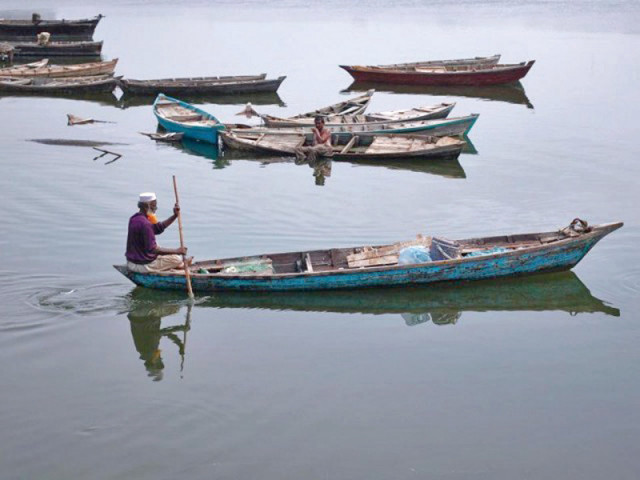Tangled up in blue: The Sindhi palla now sleeps with the fishes
The entire species is now almost lost due to illegal nets and a lack of freshwater.

One of Sindh's most delicious aquatic delights, the palla fish, is now nearing extinction in this part of the world, with those who desire it being forced to rely on the imported variety.
Popular in Keti Bunder as Chacha Nakho, 60-year-old fisherman Muhammad Hasan, claims that several kinds of fish, once found in abundance in these waters, are now gone. "More will disappear," he warns. "Interference of humans in the matters of nature has disturbed everything."
According to the fishermen of the Indus Delta, it was not long ago that thousands of tons of fish, including the palla, were caught in the region every day. "There is no palla in Sindh now," claimed the Pakistan Fisherfolk Forum (PFF) chairperson, Muhammad Ali Shah. "We are now deprived of many of the delicious fishes in the Indus Delta."
However, there are some who still claim to be selling the Sindhi palla. "This is the original Sindh palla," said a fisherman and seller at the Sujawal-Thatta Bridge, showering the stack of fish with water to keep them fresh. "People from Karachi usually purchase the palla as it is often out of the reach of those living in Thatta and Sujawal, since prices start from Rs1,500 per kilo."
Shah disagrees, saying that the fish being sold as the 'local' palla is actually being imported from Iran. "The taste of the palla varies depending on where it is from," he said. "The taste of the Bangladeshi one is different from that of Iran, while the Sindhi one was completely different. You wouldn't forget the taste of a Sindhi palla if you ever had it but now it's almost lost."
According to a PFF survey conducted in the region, fisherman are using around 6,500 'destructive' fishing nets, which damage fish population by catching the small and young fishes in it as well. "This is a major reason as to why the palla has been wiped out," says the report. "The other is the unavailability of fresh water."
Sindh's coastal belt has 17 creeks and according to the PFF, illegal and destructive nets are being used in all of them.
An act was introduced in 2005 against these nets but the PFF, an organisation working for the rights and issues of fishermen in the country, claims that no legal action is being taken against those found violating the law.
The nets, Shah claimed, have contributed in the extinction of entire species of fishes from our shores, including the palla. "We have to preserve the sea-life," he said. "Only legal action against those found using destructive nets will deter their use."
The palla was hit particularly hard by the nets and the lack of freshwater as it is born in the sea and spawns in the river, explained Shah, and requires the river waters to flow into the sea in order to flourish. "The interaction between the river and the sea began to end when barrages and dams were constructed," he told The Express Tribune.
The palla, however, is not the only fish to suffer. Shah claimed that thousands of tons of the hilsa fish could once be found in the waters of Sindh, but its population has also dwindled steadily.
"The release of water downstream is essential," he said. The water, though, has stopped and the fish are not the only ones to suffer. Chacha Nakho remembers the area once being surrounded in lush greenery and talked of its prosperity when the fresh water from the Indus flowed through the area. "I used to catch the palla in the Keti Bunder, but now it doesn't exist anymore."
The PFF report adds that the provincial government has imposed a ban on fishing during the months of June and July but the ban is not being implemented, and warns that without the help of the government, poor fishermen that rely on season fishing will face harsher times.
Published in The Express Tribune, July 14th, 2014.



















COMMENTS
Comments are moderated and generally will be posted if they are on-topic and not abusive.
For more information, please see our Comments FAQ